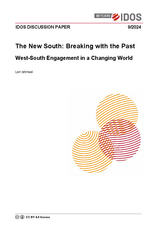Discussion Paper
The New South: breaking with the past: West-South engagement in a changing world
Ishmael, LenDiscussion Paper (9/2024)
Bonn: German Institute of Development and Sustainability (IDOS)
ISBN: 978-3-96021-234-8
DOI: https://doi.org/10.23661/idp9.2024
Price: 6 €
The early 1960s can be regarded as the “Big Bang” for international cooperation and development policy. The US was pushing an international system to support developing countries, and in 1961, it established the US Agency for International Development (USAID). The same year saw the Organisation for Economic Co-operation and Development (OECD) set up its Development Assistance Committee (DAC). Germany’s post-WWII engagement in international development cooperation took an institutional shape with the founding of the Federal Ministry for Economic Cooperation and Development (BMZ) also in 1961. Shortly after, in March 1964, the German Institute of Development and Sustainability (IDOS, formerly German Development Institute / Deutsches Institut für Entwicklungspolitik (DIE)) was created with the mandate to train practitioners and post-graduates to work in the new field of development policy and offer research-based advice to the field of international cooperation.
Today, 60 years later, we look back at six decades of research, policy advice, training, knowledge, cooperation and joint learning, with the constant aim of finding innovative and implementation-oriented solutions to current development challenges. The focus of our work is on the interdependence of “development” and “sustainability” and the system of international cooperation itself, in the context of geopolitical shifts. Decent living worldwide and for all social groups is only possible today and in the future if planetary boundaries are adhered to, that is, if political, economic and social development is accompanied by the protection of biodiversity, soils, water and oceans and a radical reduction of climate-damaging emissions is achieved. This requires the climate-stabilizing transformation of production systems and consumption behavior in countries of all income groups, but with targeted support for low- and middle-income countries. It is about envisioning, designing and implementing pathways into sustainable futures around the globe. A reformed, rule-based international order needs to address double-standards and ensure that rules of the game apply to all. Such an order must be based on the recognition of human rights and international law and constructive multilateral cooperation in a multipolar world.
Len Ishmael, in her keynote at IDOS’ 60th anniversary event, addresses these challenges of shaping futures by reflecting on the state of our world and world order today, determining how and by whom futures are being negotiated. She argues that our world is standing at a crossroads. The “New South” is re-considering its identity, aware of its increasing agency, and pursuing alliances that support the New South’s “emergence”. Her assessment is clear: the “Old North” must boost its attractiveness to countries in what she calls the New South if it wants to be considered an important player in upcoming future-making. This seeking of alliances with the New South is not about giving up “Northern” interests or values; instead, it is about shaping reciprocal, trusted partnerships in areas of joint interest and respecting one another’s differences.
Len Ishmael’s keynote “The New South: Breaking with Past: West-South Engagement in a Changing World” is a must-read for all those reflecting on the state of the world today and with the ambition to co-shape its future in a collaborative and constructive manner. (Foreword by Anna-Katharina Hornidge)
Contact
Cornelia Hornschild
Publication Coordinator
E-mail Cornelia.Hornschild@idos-research.de
Phone +49 (0)228 94927-135
Fax +49 (0)228 94927-130
Alexandra Fante
Librarian/ Open Access Coordinator
E-Mail Alexandra.Fante@idos-research.de
Telefon +49 (0)228 94927-321
Fax +49 (0)228 94927-130



![[Translate to English:] Photo: Alexandra Fante, Bibliothekarin/Open Access-Koordinatorin](/fileadmin/_processed_/f/0/csm__c_Deutsches-Institut-fuer-Entwicklungspolitik_Fante_94ce4fa1ba.jpg)